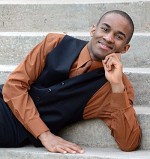Column Name
Title
For Juilliard instrumentalists, there are certain givens: lots of practice punctuated by performances. For Khari Joyner, who’s finishing his combined bachelor’s and master’s degrees this month and who will start in Juilliard’s doctoral program in the fall, there was some added excitement on Tuesday, April 1. For one thing, he was giving the U.S. premiere of Valentin Bibik’s Cello Concerto No. 2 with the New Juilliard Ensemble that night. For another, he’d been asked a couple days earlier to take part in a documentary that former Ambassador Andrew Young’s foundation is making about baseball great Hank Aaron. (In middle school, Atlanta native Joyner had a scholarship from Aaron’s Chasing the Dream Foundation.) Here’s how the day played out.
Body
6:30 a.m. This is my usual wake-up time during the week—if I’m going to the airport or have an appointment, I’ll set the alarm, but 95 percent of the time I don’t.
6:55 a.m. Check emails and peruse my to-do list. Then I go for a quick walk around the block to wake me up even more.
7:15 a.m. Usually, I’d have something filling like an omelet for breakfast, but since this is a day with a big performance, I just eat cereal and a bagel to keep it light and save some time. I have to get a cup of orange juice to get me going, though—it’s kind of my version of coffee.
8 a.m. Head over to school to go to “my” practice room, which almost always is available at that time of morning. At this point, the practice is about solidifying some technical passages and working slowly to reinforce anything necessary under my fingers for tonight’s performance. The cadenza, which is around five minutes long, is the most challenging part of this piece, and it has passagework of 10ths, 11ths, and 12ths, all in high positions on the cello, and it’s somewhat quick in tempo. Otherwise, the rest of the piece has quite a few places that involve quick shifts and expressive playing in all registers.
10:30 a.m. More email, and then it’s time to make some phone calls and get details about the three-hour film shoot tomorrow morning for the documentary. I’ll need to play some Bach, answer some questions, and walk around the building and up and down Broadway.
11:30 a.m. Grab a salad for lunch.
Noon Dress rehearsal in Tully Hall goes well and helps me get adjusted to playing the Bibik in the hall. The acoustic balance is much different than in our rehearsal room, mainly because of the spacing of the players on stage and the larger space in general.
1 p.m. Time for a lesson with my teacher, Joel Krosnick. He was able to come to the dress rehearsal and listen for some things balance-wise, so he mainly discussed those passages in my lesson. He even asked me a couple questions about the score.
2:30 p.m. Back to the dorm for some Alexander Technique active rest, which involves lying on the floor with books supporting my head and allowing time for concentration and thought direction.
4 p.m. Outside for a little more fresh air, I meet up with a few friends and chat with them.
4:30 p.m. Answer some more calls about the documentary interview tomorrow. Fortunately, we can do all of the shooting at Juilliard—whew! Saves me calling around for other venues.
5:30 p.m. Back to the cafeteria for a light pasta dish to keep me energized.
6:30 p.m. I’m getting more and more pumped for the energy that comes with the piece—and now I need to hop in the shower and get dressed. I decide to go with a blue shirt and a silver tie.
7:30 p.m. Heading over to Tully. Two of my Juilliard scholarship donors, Ronald Csuha and Cecil Yarbrough, will be there tonight for the concert. We won’t be able to get together, but we’ve made plans to have dinner tomorrow. [Joyner also holds the J. Victor Monke and Beulah E. Monke Scholarship in Honor of Keri-Lynn Wilson and Eric Wilson.]
8 p.m. Showtime!
10 p.m. A very, very successful concert! The Bibik was a joy to perform and I felt very connected to it—I’m quite surprised at how fast all of us were able to put it together. The rest of the concert was amazing as well. I hope we get good reviews—a New York Times critic was there [editor’s note: the review was indeed good—and the cadenza was singled out]. After congratulating the other musicians, I pack up my cello and head back to the dorm to change—and clean the suite bathrooms (it’s our turn) with my roommate, Jeremy Rhizor [a second-year Historical Performance violinist].
11:30 p.m. After we’ve finished cleaning, we have a nice chill conversation with our other suitemates.
Midnight Looking over tomorrow’s schedule, I see that I have a long day ahead: in addition to the three-hour interview, a two-hour class, a break that I’ll reserve for laundry, dinner, and errands, my cello studio class, a coaching with Audrey Axinn on a Beethoven sonata I’m playing with fortepiano and Baroque cello. So—time for bed!





